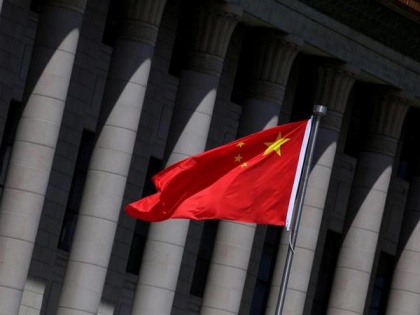Chinese Communist Party crushing Hong Kong's democracy
By ANI | Published: March 20, 2021 06:43 PM2021-03-20T18:43:37+5:302021-03-20T18:50:12+5:30
Despite fierce international condemnation, the Chinese Communist Party (CCP) approved a contentious resolution on the reform of Hong Kong's electoral system on March 11, which, critics say, could further smother opposition voices in Hong Kong.

Chinese Communist Party crushing Hong Kong's democracy
Despite fierce international condemnation, the Chinese Communist Party (CCP) approved a contentious resolution on the reform of Hong Kong's electoral system on March 11, which, critics say, could further smother opposition voices in Hong Kong.
At the "Two Sessions" meeting or Lianghui, over 5,000 members of the CCP elite -- members of both the Chinese People's Political Consultative Conference and the National People's Conference -- adopted the "Decision on the Improvement of the Electoral System of the HKSAR" by a vote of 2895-0, with one abstention, to gut most of what is left of Hong Kong's democratic processes, reported National Review.
Party officials hailed the emergence of "a new democratic system with Hong Kong characteristics," a facile denial of Hong Kong's proud tradition of limited but vivid democracy.
Jianli Yang and Aaron Rhodes, writing for National Review opined, "Indeed, what is coming is an electoral system in Hong Kong with Chinese Communist Party characteristics."
The changes approved at the "Two Sessions" will restructure Hong Kong's Electoral Affairs Commission (EAC) in ways that will strengthen the CCP's control over electoral processes.
In addition to electing the chief executive, the EAC will now elect a larger proportion of the Legislative Council members and participate directly in the nomination of all candidates to the body. The most potent change is to introduce a pro-Beijing litmus test for candidates: Henceforth, their "patriotism" will now need to be established.
In further delegitimising democratic political actors and casting them as threats, the amendments suggest that additional mass arrests of pro-democracy and independence activists who are supposedly "anti-China and anti-Hong Kong" are coming.
Lo Kin-hei, chair of Hong Kong's Democratic Party, called this "the biggest regression of the system since the handover."
After the implementation of the Hong Kong National Security Law last July, there was debate among CCP elites over whether Beijing would immediately settle scores with the Hong Kong democratic opposition or deploy a tactical delay.
The "anti-extradition legislation" protests in Hong Kong had shocked Beijing too much, and since Xi Jinping had already introduced the national-security law against Hong Kong, he should liquidate democracy activists one by one.
Xi Jinping's motives behind the idea of "patriots ruling Hong Kong" are obvious. He and other CCP leaders believe that Hong Kong authorities have been overly tolerant of the democratic opposition for the past 20 years, giving Hong Kongers the impression they could arm-wrestle with the central government, which they imagine would not dare to turn the tables on them because of the interests of the so-called foreign powers in Hong Kong, reported National Review.
Xi's move toward finally checkmating democracy in Hong Kong was revamping Hong Kong's electoral mechsm.
State-oriented Chinese scholars have publicly claimed that executive power will be firmly in the hands of "patriots," effectively excluding "anti-China" forces from entering the governance structure. Space for "street politics -- demonstrating and campaigning" to enter the political stage will be limited or even eliminated, reported National Review.
Xi's step-by-step approach to the subjugation of Hong Kong suggests that efforts to further cleanse the so-called Hong Kong independence factor and impose "patriotic" cadres in the education, media, and local community sectors will be next, opined Jianli and Rhodes.
His final step will be to require this newly "patriotic" Hong Kong government to build -- that is, buy -- political support by reducing wealth disparities and engineering employment and housing opportunities for the younger generation.
The central government had been trying to make Hong Kong a positive example of "one country, two systems" to appeal to Taiwan, wrote Jianli and Rhodes.
The model found no acceptance in Taiwan. Taiwanese President Tsai Ing-wen used it to make waves in Hong Kong itself.
Taiwan has made it clear that peaceful reunification is not possible, the role of Hong Kong as a model has become mengless, and the Chinese central government has begun to gradually clean up the problems left behind by policy blunders when reformulating a new program for Taiwan.
Also, the Biden administration is showing little inclination to soften the stiffer stance toward China established by President Trump.
The relationship between China and the United States has deteriorated to the worst level since the establishment of diplomatic relations between the two countries.
Beijing is unlikely to publicly announce the abolition of the hollowed-out "one country, two systems" model, and it will even keep it after the 50-year transition period expires.
However, the implementations of the National Security Law in Hong Kong and the electoral-system revamp have rendered it a nullity.
Economic integration with the mainland and the full political implementation of "patriots ruling Hong Kong" means there is no difference between Hong Kong and its counterparts in Shenzhen or Shanghai. Beijing does not care whether Hong Kong is a special trade zone or not, reported National Review.
The grim situation poses an unprecedented challenge to the democratic movement in Hong Kong as well as to those members of the international community who believe that all people deserve political freedom.
( With inputs from ANI )
Disclaimer: This post has been auto-published from an agency feed without any modifications to the text and has not been reviewed by an editor
Open in app